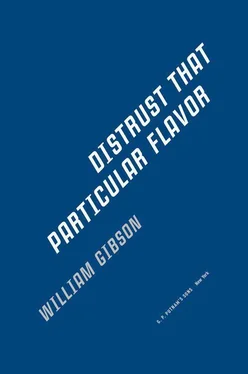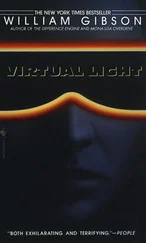FINANCE DATA A STATE SECRET
SINGAPORE — A government official, two private economists, and a newspaper editor will be tried jointly on June 21 for revealing an official Singaporean secret — its economic growth rate.
Business Times editor Patrick Daniel, Monetary Authority of Singapore official Shanmugaratnam Tharman, and two economists for regional brokerage Crosby Securities, Manu Bhaskaran and Raymond Foo Jong Chen, pleaded not guilty to violating Singapore’s Official Secrets Act.
South China Morning Post, 4/29/93
Reddy Kilowatt’s Singapore looks like an infinitely more livable version of convention-zone Atlanta, with every third building supplied with a festive party hat by the designer of Loew’s Chinese Theater. Rococo pagodas perch atop slippery-flanked megastructures concealing enough cubic footage of atria to make up a couple of good-sized Lagrangian-5 colonies. Along Orchard Road, the Fifth Avenue of Southeast Asia, chockablock with multilevel shopping centers, a burgeoning middle class shops ceaselessly. Young, for the most part, and clad in computer-weathered cottons from the local Gap clone, they’re a handsome populace; they look good in their shorts and Reeboks and Matsuda shades.
There is less in the way of alternative, let alone dissident, style in Singapore than in any city I have ever visited. I did once see two young Malayan men clad in basic, global, heavy metal black — jeans and T-shirts and waist-length hair. One’s T-shirt was embroidered with the Rastafarian colors, causing me to think its owner must have balls the size of durian fruit, or else be flat-out suicidal, or possibly both. But they were it, really, for overt boho style. (I didn’t see a single “bad” girl in Singapore. And I missed her.) A thorough scan of available tapes and CDs confirmed a pop diet of such profound middle-of-the-road blandness that one could easily imagine the stock had been vetted by Mormon missionaries.
“You wouldn’t have any Shonen Knife, would you?”
“Sir, this is a music shop.”
Although you don’t need Mormons making sure your pop is squeaky clean when you have the Undesirable Propagation Unit (UPU), one of several bodies of official censors. (I can’t say with any certainty that the UPU, specifically, censors Singapore’s popular music, but I love the name.) These various entities attempt to ensure that red rags on the order of Cosmopolitan don’t pollute the body politic. Bookstores in Singapore, consequently, are sad affairs, large busy places selling almost nothing I would ever want to buy — as though someone had managed to surgically neuter a W. H. Smith’s. Surveying the science-fiction and fantasy sections of these stores, I was vaguely pleased to see that none of my own works seemed to be available. I don’t know for a fact that the UPU had turned them back at the border, but if they had, I’d certainly be in good company.
The local papers, including one curiously denatured tabloid, New Paper , are essentially organs of the state, instruments of only the most desirable propagation. This ceaseless boosterism, in the service of order, health, prosperity, and the Singaporean way, quickly induces a species of low-key Orwellian dread. (The feeling that Big Brother is coming at you from behind a happy face does nothing to alleviate this.) It would be possible, certainly, to live in Singapore and remain largely in touch with what was happening elsewhere. Only certain tonalities would be muted, or tuned out entirely, if possible….
Singaporean television is big on explaining Singaporeans to themselves. Model families, Chinese, Malay, or Indian, act out little playlets explicating the customs of each culture. The familial world implied in these shows is like Leave It to Beaver without The Beave, a sphere of idealized paternalism that can only remind Americans my age of America’s most fulsome public sense of itself in the mid-1950s.
“Gosh, Dad, I’m really glad you took the time to explain the Feast of the Hungry Ghosts to us in such minutely comprehensive detail.”
“Look, son, here comes your mother with a nutritious low-cholesterol treat of fat-free lup cheong and skimmed coconut milk.”
And, in many ways, it really does seem like 1956 in Singapore; the war (or economic struggle, in this case) has apparently been won, an expanded middle class enjoys great prosperity, enormous public works have been successfully undertaken, even more ambitious projects are under way, and a deeply paternalistic government is prepared, at any cost, to hold at bay the triple threat of communism, pornography, and drugs.
The only problem being, of course, that it isn’t 1956 in the rest of world. Though that, one comes to suspect, is something that Singapore would prefer to view as our problem. (But I begin to wonder, late at night and in the privacy of my hotel room — what might the future prove to be, if this view should turn out to be right?)
Because Singapore is one happening place, biz-wise. I mean, the future here is so bright…. What other country is preparing to clone itself, calving like some high-tech socioeconomic iceberg? Yes, here it is, the first modern city-state to fully take advantage of the concept of franchise operations Mini-Singapores! Many!
In the coastal city of Longkou, Shandong province, China (just opposite Korea), Singaporean entrepreneurs are preparing to kick off the first of these, erecting improved port facilities and a power plant, as well as hotels, residential buildings, and, yes, shopping centers. The project, to occupy 1.3 square kilometers, reminds me of “Mr. Lee’s Greater Hong Kong” in Neal Stephenson’s Snow Crash , a sovereign nation set up like so many fried-noodle franchises along the feeder routes of edge-city America. But Mr. Lee’s Greater Singapore means very serious business, and the Chinese seem uniformly keen to get a franchise in their neighborhood, and pronto.
Ordinarily, confronted with a strange city, I’m inclined to look for the parts that have broken down and fallen apart, revealing the underlying social mechanisms; how the place is really wired beneath the lay of the land as presented by the Chamber of Commerce. This won’t do in Singapore, because nothing is falling apart. Everything that’s fallen apart has already been replaced with something new. (The word “infrastructure” takes on a new and claustrophobic resonance here; somehow it’s all infrastructure.)
Failing to find any wrong side of the tracks, one can usually rely on a study of the nightlife and the mechanisms of commercial sex to provide some entree to the local subconscious. Singapore, as might be expected, proved not at all big on the more intense forms of nightlife. Zouk, arguably the city’s hippest dance club (modeled, I was told, after the rave scenes in Ibiza), is a pleasant enough place. It reminded me, on the night I looked in, of a large Barcelona disco, though somehow minus the party. Anyone seeking more raunchy action must cross the Causeway to Johor, where Singaporean businessmen are said to sometimes go to indulge in a little of the down and dirty. (But where else in the world today is the adjoining sleazy border town Islamic?) One reads of clubs there having their licenses pulled for stocking private cubicles with hapless Filipinas, so I assumed that the Islamic Tijuana at the far end of the Causeway was in one of those symbiotic pressure-valve relationships with the island city-state, thereby serving a crucial psychic function that would very likely never be officially admitted.
Singapore, meanwhile, has dealt with its own sex industry in two ways: by turning its traditional red-light district into a themed attraction in its own right, and by moving its massage parlors into the Beverly Centers. Bugis Street, once famous for its transvestite prostitutes — the sort of place where one could have imagined meeting Noel Coward, ripped on opium, cocaine, and the local tailoring, just off in his rickshaw for a night of high buggery — had, when it proved difficult to suppress, a subway station dropped on top of it. “Don’t worry,” the government said, “we’ll put it all back, just the way it was, as soon as we have the subway in.” Needless to say, the restored Bugis Street has all the sexual potential of Frontierland, and the transvestites are represented primarily by a number of murals.
Читать дальше










